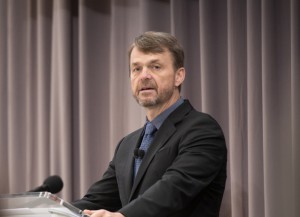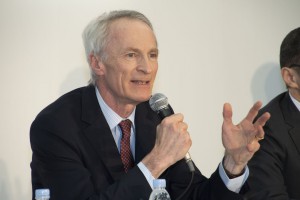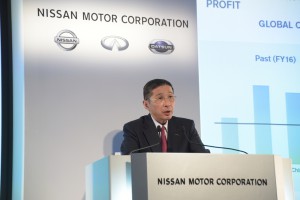
Fiat Chrysler Chief Executive Officer Mike Manley originally approached Renault over much more limited plans, such as platform sharing.
After extensive, secret negotiations, Fiat Chrysler Automobiles has laid out a plan to merge with the largest of France’s two automakers, Groupe Renault, a move that would create the world’s third-largest motor vehicle manufacturer, with annual sales of 8.7 million vehicles – and a clear number one if factoring in the volumes of Renault’s current Alliance partners, Nissan and Mitsubishi.
Both FCA and Renault have openly sought new partnerships over the past decade to both expand their geographic bases and fill in gaps in their product and technology portfolios. If, as expected, the proposed deal is completed, the new organization will have a more well-rounded global presence, with FCA bringing to the table its Jeep SUV and Ram pickup brands. Renault, among other things, provides a growing range of electric vehicles and an aggressive autonomous vehicle develop program.
Over the past decade, FCA has repeatedly said it was looking for a partner, with names like General Motors and Volkswagen on its list. But while those were seen as unsolicited proposals, talks between the Italian-American automaker and Renault have been underway since early this year. And though the French automaker early Monday said that its “Board of Directors will meet this morning to discuss this proposal,” it is expected that this is largely a formality.
“This should be seen as a friendly approach to merger between two like-minded companies,” said a ranking source involved in the negotiations, asking not to be identified by name due to the sensitivity of the talks.

Renault Chairman Jean Dominique Senard will have to win over the support not only of the Renault board but unions, governments, shareholders and even its Nissan and Mitsubishi Alliance partners.
That said, this is far from what the French would call a “fait accompli.” Both companies will have to do extensive due diligence. And there are numerous governments, unions and other entities that will have to give their sign-off. Clearly, sources said, Renault also wants to ensure that it does not cause further problems with its existing partnership with Japanese automakers Nissan and Mitsubishi. That Alliance has been sorely strained by the arrest last November of Carlos Ghosn, who served not only as head of the three-manufacturer group but as chairman or CEO of each of the three carmakers.
(Click Here for our original report on the Renault/FCA talks.)
With the Renault board signing on, the two companies would follow up with a Memorandum of Understanding, or MoU. In term, insiders expect that a completion of a final 50/50 merger proposal would be wrapped up within 12 to 18 months.
Until then, according to FCA insiders, that company will continue to operate on a “business-as-usual” approach, following the five-year plan originally laid out in June 2018 by its former CEO, the late Sergio Marchionne – and which his successor, Mike Manley, has said he will maintain.
Longer-term, there are numerous changes likely to follow if the FCA proposal results in the planned merger. For that company, it could lead to a reanalysis of its brand portfolio, including the viability of maintaining the poor-selling Fiat brand in North America and even the future of the namesake Chrysler brand which currently has only two products in its portfolio. FCA’s five-year strategy also calls for massive investments in its Alfa Romeo brand, something that might be scaled back, especially based on its weak performance in North America.
For Renault, among other things, the two companies might look at whether that brand might want to stage a return to the U.S. market it abandoned nearly three decades ago. Renault, meanwhile, might find great opportunity to expand its light truck portfolio with the help of Jeep and Ram. And, barring a further meltdown of the strained Renault-Nissan-Mitsubishi Alliance, the two Japanese automakers might find similar opportunities. Nissan, in particular, has had trouble playing in the lucrative U.S. full-sized truck market with its Titan model.
There are other issues to be resolved. Currently, FCA has ongoing platform-sharing arrangements with Renault’s French rival, PSA Group. That agreement could be strained by a Fiat Chrysler tie-up to Renault, though it is expected to continue for the time being.
Ironically, it was PSA that FCA first began talking with about a possible relationship before it saw a greater opportunity with Renault, sources indicate. Talks between FCA and Renault began on a limited scale, with the two initially discussing platform sharing and other opportunities before the possibility of a merger began to come together.
(PSA’s Tavares throws cold water on hot FCA rumors. Click Here for more.)
Barring an unexpected hitch, the two manufacturers would become the fourth-largest player in North America, number two in Europe, Africa and the Middle East and the king-of-the-hill in Latin America. Then there is the Asia Pacific region, where they lag and hope that by joining forces they can make significant headway. That’s especially true in China, where they individually lag far behind leaders like Volkswagen and General Motors.
If the deal comes through, it would be the latest twist on a saga of alliances and other relationships for both Renault and FCA.
The French automaker bailed out its Japanese alliance partner in 1999 with an investment of $6 billion, something few analysts at the time expected to work. Mitsubishi joined the alliance three years ago as part of another rescue plan.
For Nissan, there are concerns about what the proposed Renault-Nissan merger might mean, according to a senior-level source. On the Renault side, TheDetroitBureau.com was advised that the French want to make it clear that they aren’t viewing this as an alternative to the troubled Renault-Nissan-Mitsubishi Alliance. Significantly, a statement by FCA noted that the merger would generate an estimated 5 billion euros in annual synergies to the group, 1 billion of that for the two Japanese automakers alone.
The history of what was originally known as the Chrysler Corp. has had its own radical ups-and-downs. Forty years ago, then-Chairman Lee Iacocca outlined a government bail-out plan meant to stave off bankruptcy, a proposal so complex that when asked what might happen if things didn’t come together precisely as outlined, he said, “Then, the pieces of the mosaic fall off the wall.” Within several years, Chrysler was booming again, but it would go through several more up-and-down cycles before, in 1998, Iacocca’s successor, Bob Eaton decided a partner was needed to move forward.
The subsequent “merger-of-equals” with then Daimler-Benz AG was a problem almost from the start and wound up collapsing by the middle of the coming decade, the Germans negotiating a fire sale to Cerberus Corp., a New York investment company. That move itself collapsed as the U.S. economy tumbled into its worst recession in decades.

The propised deal with Renault is a setback for PSA CEO Carlos Tavares who had also been talking to FCA.
Chrysler was near death when the Bush Administration – and then the incoming Obama White House – offered a new bail-out. But the new president laid out a catch. He would only come up with billions of dollars in aid if a white knight came along to help ensure Chrysler’s viability.
One possibility was Nissan which, under then-CEO Ghosn, engaged in extensive discussions with the American automaker. But a proposed deal collapsed, a ranking source close to the Nissan board told TheDetroitBureau.com this past weekend, because of the extensive debt and liabilities weighing down on Chrysler’s finance subsidiary.
Those debts, in fact, were wiped out by the subsequent bankruptcy, and Sergio Marchionne brought Fiat SpA to the table to fulfill the Obama demands, in what became a slow-moving takeover.
(FCA taps senior Nissan exec to run its Jeep brand. Click Here for more.)
But Marchionne openly expressed his fear that FCA itself didn’t have the necessary gravitas in an industry ripe for consolidation. He repeatedly said he wanted to find another merger partner and went so far as to make an unsolicited – and quickly rejected – bid to GM.
Before his death last summer, Marchionne said he believed FCA could survive on its own but as CEO Mike Manley continued to seek, at the least, new alliances that could address the company’s weaknesses. Among other things, it has teamed up with Waymo, the Google spin-off, on autonomous vehicles. And it originally approached Renault to explore platform sharing and other possible projects.
Those talks quickly took on a life of their own and, as one source told TheDetroitBureau.com, “could be a catalyst leading to broader changes within the auto industry.”

